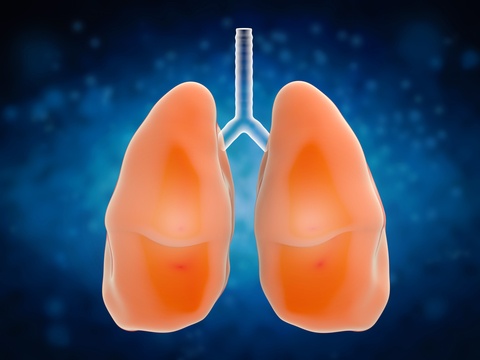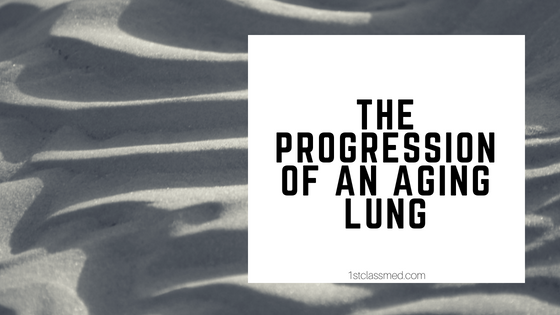This change to your lungs and surrounding areas can lower the amount of oxygen your body is getting, as well as increase the amount of carbon dioxide remaining in the body.
As we age it is important to stay healthy and try to slow down the aging process.
By staying active, quitting smoking (or never starting) and making sure you regularly meet with your doctor are all ways to help you stay healthy and help keep your lungs strong.

Changes to the Body
As we age, our body slowly transforms and is constantly changing in many different ways.
There are changes to the bones, muscles, tissue, nervous system, immune system and an increased amount of inflammation to name a few changed from aging.
Our bones become thinner and can change shapes, making different areas of the body suffer.
Our lungs have less room to breathe as our ribcage gets smaller, and our legs and arms may feel weaker and possibly easier to break.
The muscles around our lungs grow weak, causing more effort to be required in order to breathe the same.
You most likely will not notice a drastic change in your breathing as it progressively gets worse over time.
If you do notice a struggle to breathe or shortness of breath, contacting your doctor can help figure out if there is an underlying condition or if it is just aging of the lungs.
Your lung tissue has a drastic change as well as we age, not only do the tissues loose elasticity, they also struggle to keep your airways completely open.
The lack of elasticity can cause air to get trapped in your lungs, and carbon dioxide cannot be removed as easily.
Our brains are a part of the nervous system, as our brain sends signals to other part of the body.
Not only does less oxygen get to our brains when we aren’t getting enough oxygen in our lungs, but part of our brain controlling breathing may shut down.
Nerves in your airways can also become less sensitive and begin to allow more particles like smoke or germs to collect in the lungs, this can make it hard to cough up.
Our coughing nerves also become less sensitive and you will have less of a coughing reflex.
Our immune system gets weaker as we age, which can make it harder to fight lung infections and diseases that can affect the lungs.
The lungs also struggle to recover after exposure to smoke or pollutants, sometimes they do not recover at all, making you lose lung capacity even more.
Inflammation is a huge factor as we age, chronic inflammation can make it harder on our bodies.
It is linked to heart disease, arthritis, cancer and Alzheimer’s disease, as well as a factor in many lung diseases.
What Does That Mean for Me?
As we get older, our body loses its ability to breathe to our lungs full capacity, and it can make us more susceptible to infections, and diseases.
The risk to get lung infections, shortness of breath, low oxygen levels and abnormal breathing patterns are all higher as we age.
Overall it means we need to work harder and take very good care of our bodies, by exercising, cutting out smoking and keeping in touch with our doctor.
It can also be beneficial to take a calcium supplement in order to keep your bones strong and prevent any deterioration.
Studies have shown that consumption of antioxidant & flavonoid rich foods, such as bananas, apples and tomatoes (4 servings per day) can help slow decline of lung function.
It has also been proven beneficial to get vaccines for serious illnesses such as pneumonia and the flu.
Consistent respiratory infections like pneumonia can lead to lung damage and further decline in function.
Speaking with your doctor will help you figure out if there is anything more you can do to prevent your lungs from degenerating.

Testing
If you feel that your breathing is worse than it should be for your age, speak with your doctor about possible tests that can be done to measure your breathing.
Spirometry: the most common lung test, a spirometry test has you breathe into a mouthpiece that is attached to a spirometer. A spirometer tests lung function, speed and capacity of air in the lungs.
Gas Diffusion: this test is used to measure the air that moves through the alveoli every minute, this helps doctors see how well the lungs are absorbing air.
Inhalation challenge: commonly used for asthma patients, the IC tests your lungs and how well they defend themselves against irritants.
Exercise stress: normally done by having you exercise and see how your lungs react and are affected by exercise.
Body plethysmography: this test measure not only the lung capacity, but also any remaining air left in the lungs after a full exhalation.
Conclusion
Though it can be scary as we age, it doesn’t mean we need to feel like we can no longer do anything.
Our lungs age as we do, and it can make it harder to breathe, but it normally will not be anything noticeable.
If you do start to notice a change, speaking with your doctor about your struggle to breathe can lead to tests that can diagnosis any lung conditions.
In general, taking care of your body and lungs at a young age can help slow any progression of aging in your lungs.
Always consult with your doctor about any exercise, meal plans or concerns with your body.




